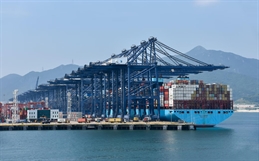
Logistics and shipping companies are warning of dire impacts to the supply chain of China's recent move to put Shenzhen — a major port city — in at least a week-long lockdown to halt a growing Covid-19 outbreak.
Lars Jensen, CEO of liner consultancy Vespucci Maritime warned that the newest lockdown in Shenzhen could hit supply chains harder than the disruption caused by the blockade of the Suez Canal last year.
"All stakeholders now need to prepare for imminent Covid disruption of container cargo flows to and from Yantian," Jensen said in a Linkedin commentary, as he cited Seko Logistics' statement on the details of the weeklong lockdown with Yantian Free Trade Zone closed from March 14-20.
"It should be kept in mind that when Yantian was shut down due to Covid last year, the disruptive impact on cargo flows was roughly twice the size of the blockage of the Suez Canal," the maritime analyst added.
Seko said in its advisory that as the outbreak of Omicron across China "worsens" local authorities are enforcing restrictions which will have an impact on its offices, warehouses, and operations."
No cargo loading in Yantian
"Restrictions are now in effect across all of Shenzhen ... for the following week, all public transportation in Shenzhen stop operating," the statement said, noting that no one will be allowed to leave their residence except to do three rounds of Nucleic Acid Testing. For the period, all businesses in Shenzhen will also be closed.
"We have not yet been advised of any official restrictions to Yantian Port, all vessels already loaded and departing this week will depart as planned," it added. "No cargo will be able to load in Yantian from next week and vessels most likely will omit the port."
Seko added that while the company has not yet been advised of any official restrictions to Shenzhen Airport, however, staff are unable to leave their homes to work at the airport. It said trucks from outside Shenzhen are also unable to enter the city.
In a note to clients, WorldWide Logistics Group said: "We are experiencing the breakout of COVID in China mainland from last week. … The government is pushing everyone to have a nucleic acid test as soon as possible. According to [the] current situation, the COVID cases may keep increasing in the following weeks."
It noted that the duration of the lockdown will impact the supply chain the most — and warned that Covid cases could increase and further extend the lockdowns.
China placed a citywide lockdown on the southern city of Shenzhen which has 17.5 million residents after the city reported 66 new Covid cases on Sunday and brought Shenzhen's total cases to over 400 since late last month. Nationwide, Covid-19 cases doubled to nearly 3,400 according to a government notice.
When the city implemented a halt in Yantian port operations last June due to an outbreak, the shipping backlog took at least a month to ease with Yantian being the world's fourth-largest port.
In a separate advisory, Maersk said it is still looking into the extent of the new Shenzhen lockdown.
"Despite stricter precautionary and control measures being taken, we remain fully operational to leave the least impact on your business," the Danish shipping line said. "We are closely monitoring the situation."
It said terminals in the Greater China Area (GCA) main ports "remain business as usual including vessel operation, yard handling, and gate-in & out."
Vessel call and departure also stay normal.
Reduced tracking services
"The overall landside transportation situation is dynamic subject to change. Trucking service, for now, is still available providing the drivers hold negative Nucleic Acid Test (NAT) report requested by local governments," it added, noting that it foresees the overall trucking operational efficiency will be "reduced significantly" due to the frequent NATs, especially in Hong Kong, Shenzhen, West Pearl River Delta, Shanghai, Yangtze inland ports, Qingdao and Tianjin.
Maersk said warehouses in Shenzhen will remain closed from March 14 to March 20.
"Warehouses in Shanghai and Qingdao keep operations for now. However drivers are requested to show health code for cargo delivery and need negative NAT report within 48 hours in case they are from medium-high risk area," it added.
Maersk also warned of longer lead times due to the suspension of the trucking service between Hong Kong and the Chinese mainland with barge service taken as an alternative for cargo moving.
"Airfreight space reservation will not proceed until the cargo is delivered to Hong Kong airport warehouse. As a consequence, It will take a longer lead time than usual for the airfreight service," it said.
Commenting on Maersk's advisory, Jensen of liner consultancy Vespucci Maritime said the impact of the lockdown could be lesser.
"Now an update from Maersk on the Covid impact on operations in China. All things considered the impact, for now, is clearly not as large as last year," he said. "Let us hope it does not get worse than this (but zero-tolerance and the Omicron variant is not a happy mix)."
Shanghai situation update
Meanwhile, Seko also gave an update on the situation in Shanghai — home to the world's busiest container port.
Shanghai, which is currently combating its own Covid-19 outbreak has implemented localized lockdowns to contain the virus.
"As the outbreak in Shanghai continues to worsen, citizens have been encouraged not to leave the city unless necessary and must take a nucleic acid test to enter or leave," Seko said in its advisory, raising the possibility of a citywide lockdown in the city as well.
"Areas of Shanghai are being locked down but there is no full citywide lockdown implemented yet, however as the situation continues to worsen this may come into effect in the coming weeks," Seko added.
"All passenger flights into Shanghai have been diverted to other cities. Currently, cargo aircraft has not been affected, however, the diversion of passenger aircraft will have an impact on air freight rates," it added.



